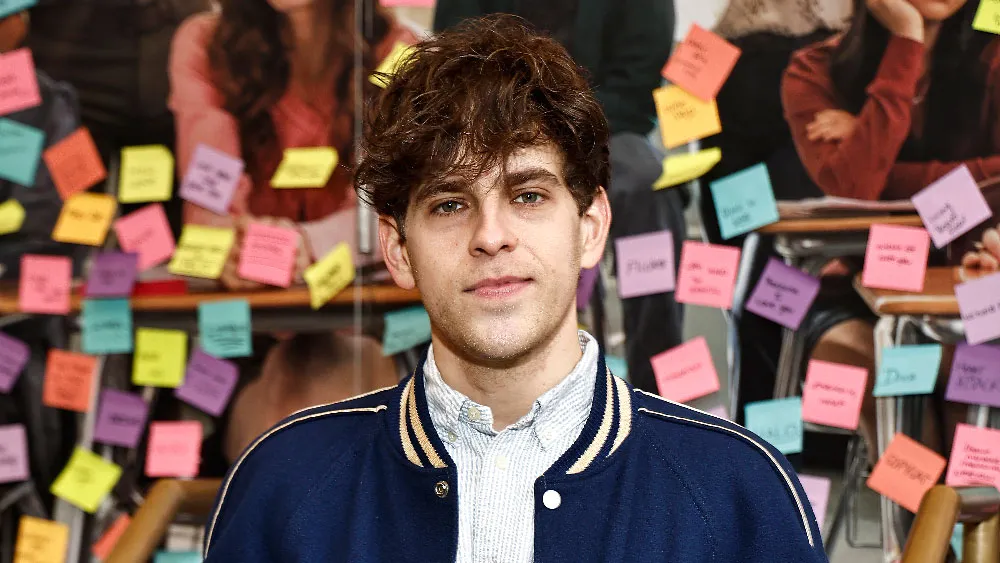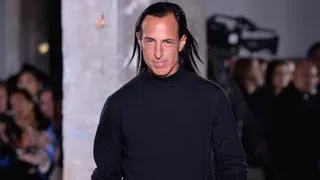April 3, 2009
TV Notes :: Thinking about the economy, Pedro, the Real World and Oprah
Robert Nesti READ TIME: 11 MIN.
Should the next Survivor go stateside? Dateline goes after debt collectors. The queerest Real World ends. Pedro director talks about his MTV biopic. Oprah takes on "Women Leaving Men for Other Women." As the gays turn. And remembering ER.
It’s the economy,stupid
As the midseason shows continue to roll out, we were thinking, given the economy, shouldn't the folks over at CBS be thinking about the next Survivor being in the US? Maybe in Detroit, where the unemployment rate just hit 25%? Or North Dakota, where half the state is under water from historic floods and residents are spending half their time filling sandbags and trying to keep them from freezing in the single-digit temps?
The skill set required to survive in this economy would require a good deal more than striking a flint to burn a rope, or eating the native bugs. Of course, the contestants wouldn't be able to run around naked or nearly so, which would cut the sexiness quotient down dramatically. Still, it would make for interesting reality TV to see if contestants could manage in their own milieu sans the ease of not having to actually make money to survive. It's a show we'd like to see.
Speaking of surviving this economy, we like Chris Hansen (NBC's Dateline) going after debt collectors and Ponzi schemers a lot better than we do seeing him set up guys with marginal IQs as online predators. Hansen's latest obsession is the illegal manner in which most debt-collection agencies target people who have defaulted on credit card payments or who are on the verge of bankruptcy. Hansen puts his pitbull tactics to excellent use with these folks, and exposes how all of them are indeed slimy.
In a two-part series March 27 and April 3, Hansen uncovers what most Americans don't know: if you are already going down for the third time financially, you don't have to put up with harassment, intimidation and threats in addition, because there are laws to protect you as a consumer.
Hansen exposes the tricks used to go after people with debt, and also reveals just what rights people have. Check out Hansen's valuable reports under Dateline/The Hansen Files at MSNBC.com.
It’s been real
The struggles most of us are facing in real-life were supposed to jettison reality TV, but they haven't, it's as popular as ever. This week, Real World: Brooklyn, the queerest season of The Real World, ends, leaving us to wonder what will happen to Katelynn and JT, among others.
The impact of The Real World may have diminished over time (although this season was particularly engaging, due to the mix in the house of gay, straight and trans people), but one alum, Pedro Zamora, has left a lasting legacy.
Oscar-winner Dustin Lance Black (Milk) wrote Pedro, the new bio-pic about Real World: San Francisco alum Pedro Zamora. The project was the idea of Paris Barclay, who approached Black to write the tribute. Barclay has been one of the few out gay directors, and also one of the few African-American directors, on the TV landscape over the past 20 years. He's also been a consistent activist for queer issues.
According to Black, who at 35 is just two years younger than Zamora would have been today, Zamora was an early role model for him: not just openly gay and on TV, but also living with HIV/AIDS.
We met and interviewed Zamora several times post-Real World, when he was traveling the country as an AIDS activist. The Cuban-born Zamora was only 22 when he died in 1994 of complications from AIDS. Black and Barclay do justice to Zamora's tragically short but vitally important life. They also remind audiences that the word Zamora was spreading about the impact HIV/AIDS was having on communities of color is a message that still needs our attention 15 years after Zamora's death.
Alex Loynez plays Pedro, and he does a fine job. But those who met Zamora could not fail to be impressed by not just his physical beauty (he was exceptionally good-looking), but by his almost luminous presence. Zamora stood out on The Real World for many reasons - message being one, of course. But for those who had the privilege of meeting him, he was a figure one cannot forget. Black and Barclay have paid stellar tribute to him as a man and as an historic figure.
Girl crush
Zamora was one of the few queers on TV back in 1994. Much has changed on the TV landscape in the intervening 15 years. And much hasn't. We've been lamenting the wave of pseudo-lesbianism among TV characters for some months now. We continue to be aggravated by the perpetuation of the straight-male-porn-driven message that women who think they are lesbian are really just waiting for a man to come in, take charge and set them back on the right - read: straight - path.
Thus we were unsure how we felt about Oprah doing her March 25 show on "Women Leaving Men for Other Women" (watch it at Oprah.com). Oprah's protege, talk-show host and supermodel Tyra Banks, for whom we have our own serious crush, did a similar show on March 10 ("Straight Girls with Gay Crushes" at tyrashow.warnerbrothers.com).
Both shows began with the same premise: women are falling for fitness guru Jackie Warner, and other women as well. That's as good an intro as, say, straight women have a crush on Ellen and women who look like her. Tyra went the CW route and had some on-air kissing (awkward but fun), but Oprah did her usual "ask the experts, talk to the people" routine.
What Oprah discovered was that more than half of all women fantasize about having sex with another woman, and one in four women has actually had a sexual experience with another woman.
Hence this episode of Oprah actually put the bi-curious tone of drama TV into perspective. Women, according to Oprah's expert-of-the-day Dr. Lisa Diamond (who looked a little suspect to us, with her spiky hair and sensible shoes), have a far more fluid range on the Kinsey Scale than men, who tend to be either zeroes (yes, that is where straight men fall - a little joke from Kinsey himself, apparently) or sixes (totally gay). Few fall in the gray areas from one through five.
Dr. Diamond, author of Sexual Fluidity: Understanding Women's Love and Desire, noted that women's sexuality moves more than men's over the course of their lifetimes, and women tend to fall in love with the person, rather than the gender.
It was actually a pretty interesting hour, highlighting a few women who had been married for years, left their husbands for other women, and how it had changed their lives, and in some cases, the lives of their children.
Yet while this sexual fluidity may be the reality for many women, the fact that no women on the tube can stay lesbian for more than five minutes continues to rankle. Which is why when we tuned into Bones last week and Angela was talking to girlfriend Roxy about them getting a dog together, then Roxy broke up with her and Angela immediately went off to have sex with her male co-worker, we were miffed.
A good friend painstakingly explained to us that this is just the "in-the-moment" way Angela is.
Be that as it may, portraying yet another character who has been in a relationship with another woman as someone who can just fall into bed with a man immediately - and we're talking minutes here, not even days - after the two break up reinforces the idea that lesbian sexuality is just a phase and not "real." We never see the obverse: men don't break up with women and hop into bed with other men, nor do women break up with men and hop into bed with other women.
So, Kinsey Scale fluidity or not, until there are solidly realistic portrayals of lesbians like Kima on The Wire, or Bianca on All My Children, where the women are first, last and always lesbians, this endless flirtation with bi-curious "girls" is never going to come across as anything but titillation.
Speaking of titillation, what's with Coach on Survivor? Are we expected to believe that the male spooning is bromance, or something more?
And we were sorry to see gay Spencer kicked off. The youngest Survivor contestant ever (a mere 19), this season's contestants were a little too tough for sweet Spencer to take. But he did make a nice statement while he was there.
World Turns
Speaking of statements, Luke and Noah have taken on anti-gay discrimination on As the World Turns. When the two decided to live together and applied for a one-bedroom apartment, they were turned down. And it wasn't the first time the landlord had refused to rent to gays, according to queer acquaintances of the couple.
The experience made Luke angry. Then he focused. He decided to put the weight of his foundation (funded with his biological and very anti-gay father's money) behind the effort. After a TV appearance on a local Oakdale morning show and then a rally, Luke was hit by a car while getting leaflets together.
Was it an accident, or was someone trying to send Luke a message? Did his father, Damian, have something to do with it? And why is Damian back in town? Last time he came for a visit, he put Luke in an ex-gay program.
Luke has enlisted his mother, Lily, in the anti-discrimination fight. She's still feeling guilty for not accepting him when he came out to her. Explaining her own reluctance to deal with her gay son has been part of the larger backdrop of the storyline, and has allowed for more education of the audience.
Given the dearth of gay male characters on the tube, seeing Luke and Noah not only front-burner, but also doing real work for gay rights, is exciting. The fact that the duo is addressing very real concerns that impact gays and lesbians daily makes the storyline even more compelling.
Speaking of compelling, viewers of The L Word will be pleased to note that Clementine Ford (Cybill Shepherd's daughter and an out lesbian) is coming back to the small screen as Mac Browning on The Young and the Restless. Those who couldn't get enough of her will now be able to catch her daily on CBS.
Another out lesbian with a new role to tout is Mrs. DeGeneres: Portia de Rossi. The actress is currently starring in ABC's dark new comedy Better Off Ted, in which she plays a boss from hell. She and the show are both terrific. (Wednesdays.)
Finally, Thursday, April 2 is the three-hour season finale of NBC's 15-year-long series, ER. There have been tributes galore in TV Guide and by every TV critic still sentient, to which we now add our own accolade. ER has suffered, as all long-running series do, from good seasons and bad. But consistently over the years, ER has broken ground, illuminating issues that weren't even considered by other shows.
Among those was HIV/AIDS, which has played a prominent role over the years on ER, long before and long after it was trendy to do so. The show had two HIV-positive characters - neither of whom was gay - for several seasons. ER also had a lesbian doctor for seven seasons.
ER regularly profiled how difficult it was for gays and lesbians to be out to their doctors or to the medical profession. Several episodes featured the problems facing the transgendered. Others addressed lesbian parenthood. Still others focused on who makes decisions for gay partners who have no legal connection to each other because same-sex marriage is still illegal in 48 states.
Was ER uneven over its 15-year run? Absolutely. But throughout those years, the show dared to remember that lesbians, gay men and the transgendered exist while other shows ignored the queer community altogether.
ER was a drama series with a heart and a compassionate message. Neither House nor Grey's Anatomy can fill its capacious shoes. It will be missed. Stay tuned.
Robert Nesti can be reached at [email protected].







